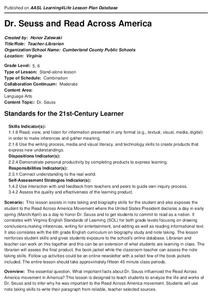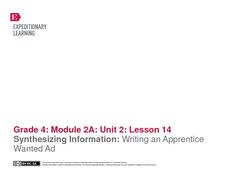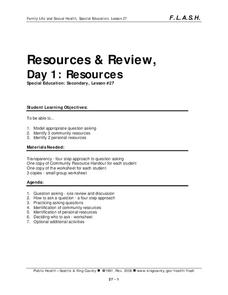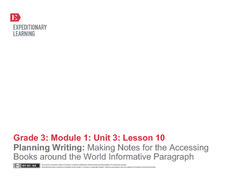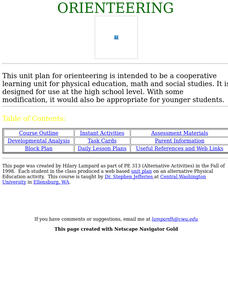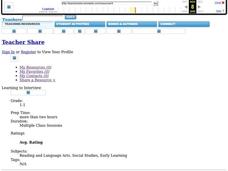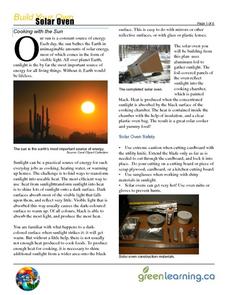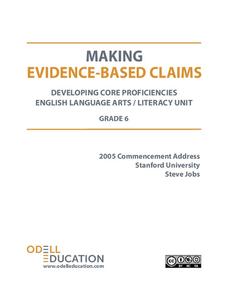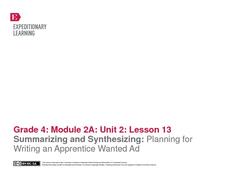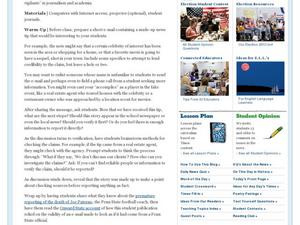Curated OER
Who Knows? Your Privacy in the Information Age
Teach young adults how to become advocates for their privacy in the modern information age. In a series of five lessons, learners explore their beliefs and opinions about privacy vs. the actual laws regarding who has the right to access...
English Enhanced Scope and Sequence
Differentiate between Formal and Informal Language
The Pledge of Allegiance, the Gettysburg Address, the National Anthem, and the Preamble to the Constitution all get close attention in an exercise that asks learners to rewrite these formally-worded documents into informal language....
Curated OER
Dr. Seuss and Read Across America
What important facts about Dr. Seuss influenced the Read Across America movement...? This is the driving question of a research project that requires scholars to find information about Dr. Seuss' life and work. Class members write a...
Virginia Department of Education
Researching Information
Give your junior high researchers a clear concept of how to go about starting their research paper with the resources available in this exercise. Students develop an idea to research, and spend time in the library or computer lab...
Curated OER
Words in the News: Stem Cell Research
A thorough resource for intermediate English learners addresses reading comprehension of informational texts, adjective forms, vocabulary acquisition, and writing in a journalistic style. Specifically, the class reads about stem cell...
EngageNY
Mid-Unit 2 Assessment: On-Demand Informational Writing
Lesson 7 focuses on building academic vocabulary and writing an explanatory letter with supported textual evidence. For the first five minutes of the instructional activity, the educator reminds the class of how to read and refer to the...
EngageNY
Main Ideas in Informational Text: Analyzing a Firsthand Human Rights Account for Connections to Specific Articles of the UDHR
Lesson 10 in a series of human rights lessons focuses on the skills of finding evidence and summarizing. Your young readers work to compare the two texts they have read in this unit: the Universal Declaration of Human Rights...
EngageNY
Revising: Strong Conclusions for My Accessing Books Around the World Informative Paragraph
It's important that writers leave their readers with a strong and satisfying conclusion. Help your young writers develop the skills to compose a concluding sentence with the steps outlined here. After class members have had a chance to...
EngageNY
Synthesizing Information: Writing an Apprentice Wanted Ad
Fourth graders view examples of help-wanted ads as they plan and create their own writing in the fourteenth instructional activity of this unit on colonial trade. The engagement of the class is captured when the teacher shares an actual...
King Country
Lesson 27: Resources & Review - Day 1: Resources
To conclude a unit on family life and sexual health (FLASH), class members use the skills they have practiced in previous lessons to develop strategies for getting information or help when they need it.
University of Delaware
Constructing Text-Based Arguments About Social Issues
Eighth graders take a stand on a variety of controversial topics with a lesson on argumentative writing. As they view an informative presentation and work with collaborative groups, they decide which side of each argument they want to...
Curated OER
Light but Strong: A Lesson in Engineering
Aspiring space engineers design a rocket launch platform together to explore materials. The platform needs to be lightweight so that it can be transported easily, but super strong so that it can support the weight of the rocket and its...
EngageNY
Planning Writing: Making Notes for the Accessing Books Around the World Informative Paragraph
Encourage your young writers to thoughtfully plan and organize their work. First, model how this is done and vocalize your thought process as you work. Next, create a class list of strategies that they can use during independent writing...
Curated OER
Orienteering
Everything you wanted to know about orienteering, and more! Take your class on an adventure with this creative activity. You will need to gather some supplies and materials and maps for your specific location, but the unit sounds like it...
Curated OER
Only the Facts
Practice the strategy of summarizing to gain meaning and knowledge from an informational text. Young readers highlight supporting details and main ideas, and then they use this to summarize two articles: "The Great Quake" and "What is an...
Curated OER
Pavement or Dirt?
What are the pros and cons to having either permeable or impermeable materials for building? How do they affect the environment? Use this role-play and the extension activities to get your environmental scientists thinking about the...
Curated OER
Library Orientation
Quidditch anyone? Here's a fun way to introduce your class to the resources available in the library as well as on the Internet. Researchers create an outline of the sources they locate about Harry Potter, J.K. Rowling, quidditch, and...
Curated OER
Learning to Interview
An authentic and engaging way to practice literacy skills, this lesson calls for young language arts pupils to conduct interviews with classmates and family members. First, pupils watch as the teacher models the interview process with a...
Curated OER
When Is a Noun a Verb? Examining Double Duty Words
The New York Times' Learning Network provides great lessons! This one uses articles from the paper to help readers understand homonyms like mail (verb and noun). It also includes an exercise in reading informational text. Links to the...
Green Learning
Build Your Own Solar Oven
This is not exactly a lesson plan, but rather a six-page document detailing how to build a solar oven. A bit of background information, materials list, diagrams and photos, and clearly-written procedures are all included. There are no...
Odell Education
Making Evidence-Based Claims: Grade 6
In order to make evidence-based claims, one must be able to draw explicit information from text. From here, learners take that information, analyze the text to develop a deeper understanding, and connect with the information in order to...
Curated OER
Get in the Newspaper Habit
Dive into journalism with your high schoolers! The resources provided here will help your learners write unbiased, clear, and succinct newspaper articles. First they spend time sifting through stacks of articles, filling out a graphic...
EngageNY
Summarizing and Synthesizing: Planning for Writing an Apprentice Wanted Ad
In instructional activity 13 of this unit on colonial trade, young researchers learn about apprentices as they prepare to write help-wanted ads for the specific trade they have been researching. To begin, the class listens closely as the...
Curated OER
Check It Out: Verifying Information and Sources in News Coverage
If it’s in the news it must be true, right? Prompted by a New York Times article, class members consider the importance of accuracy in reporting and validating sources. The detailed plan includes warm-up exercises, discussion questions,...




